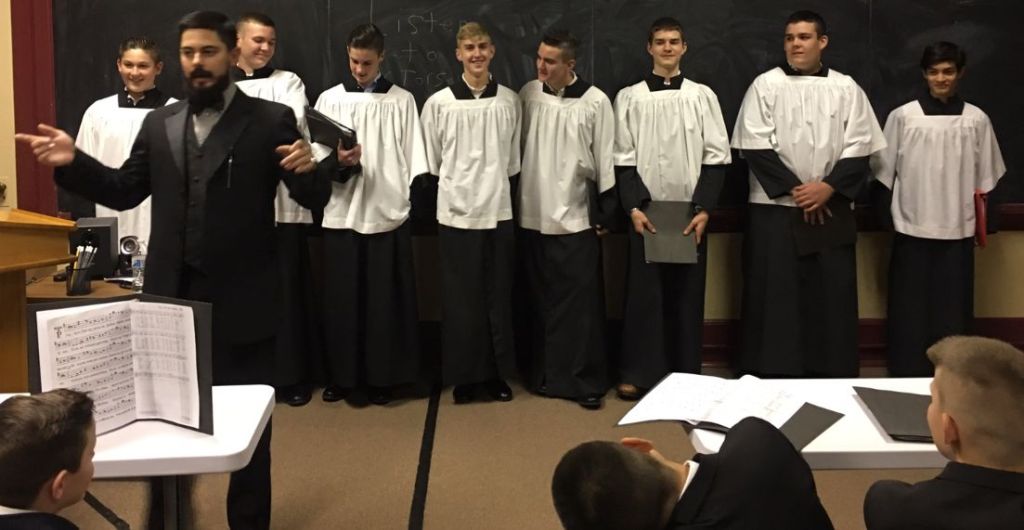
 T is an oft-repeated truism that the future is in the hands of the youth. To a group of young people St. John Paul II once said: “The future is in your hearts and in your hands.” And yet the future that the youth will usher in depends in large part upon what we instill in their hearts and place in their hands. Applying this notion to sacred music, it is clear that we should do all that we can to form young people to understand the mens ecclesiae regarding liturgical music, and to fill their ears, hearts, and minds with truly sacred music from a young age. And not just the children with natural musical aptitude!
T is an oft-repeated truism that the future is in the hands of the youth. To a group of young people St. John Paul II once said: “The future is in your hearts and in your hands.” And yet the future that the youth will usher in depends in large part upon what we instill in their hearts and place in their hands. Applying this notion to sacred music, it is clear that we should do all that we can to form young people to understand the mens ecclesiae regarding liturgical music, and to fill their ears, hearts, and minds with truly sacred music from a young age. And not just the children with natural musical aptitude!
I’m very blessed to work in a parish where we have made this a priority, and so I shall endeavor to share some of our efforts, successes, and challenges in several blog posts over the coming months. For this post, I’ll just share an overview of our program in its current form, and we can dive into some more details in the future.
In our small Latin Mass community–with an average Sunday Mass attendance of about 475–we have more than 80 students ages 7-18 in our Chorister program. Choristers meet once a week as an extension of our religious education program. Split into five separate classes (more on how we separate them in a future post), Choristers is a combined lecture/practicum program to introduce students to the history, philosophy, theory, and application of sacred music.
 Our Choristers are not auditioned, and all students participating in the weekly religious education program also participate in Choristers. Along with their classwork, the Choristers prepare chant, hymns, and simple polyphony to sing for two High Masses per semester. The program has grown tremendously in the past three years (there were about 35 students in 2017/18), and the students genuinely enjoy learning about sacred music. One of the most rewarding things for me as their teacher and director is when, as just recently happened, a parent remarks: “My boy has always been an athlete, a football player. Now I hear him wandering around the house humming Gregorian chants!” Deo gratias! (N.B. I have no bias against athletes; I’ve been a competitive skier in the past. I just love it when others make the epiphanic realization that athleticism and musicianship are not mutually exclusive!)
Our Choristers are not auditioned, and all students participating in the weekly religious education program also participate in Choristers. Along with their classwork, the Choristers prepare chant, hymns, and simple polyphony to sing for two High Masses per semester. The program has grown tremendously in the past three years (there were about 35 students in 2017/18), and the students genuinely enjoy learning about sacred music. One of the most rewarding things for me as their teacher and director is when, as just recently happened, a parent remarks: “My boy has always been an athlete, a football player. Now I hear him wandering around the house humming Gregorian chants!” Deo gratias! (N.B. I have no bias against athletes; I’ve been a competitive skier in the past. I just love it when others make the epiphanic realization that athleticism and musicianship are not mutually exclusive!)
In future posts about engaging young people in sacred music, I’ll address a few important topics:
- What sort of curriculum is effective?
- Why allow non-musically oriented students in the program?
- What techniques are useful to keep students engaged in lectures and rehearsal?
- What’s the difference between this sort of Chorister program and a typical youth choir?
- What kind of external support is required to make a Chorister program successful?
I’m sure other ideas will come to mind. If you have any specific questions you’d like me to address, please feel free to email me.
Stay tuned for more, and may God reward you for your dedication to sacred music!
+JMJ+


